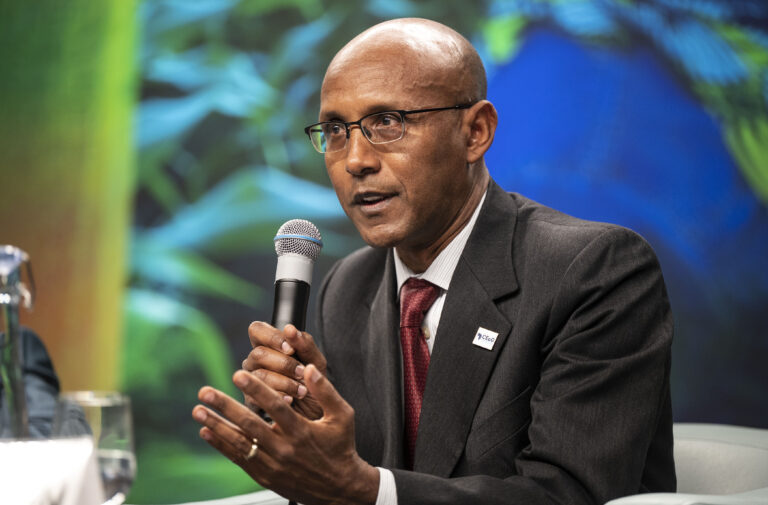
CGIAR Executive Managing Director, Ismahane Elouafi. Photo/Newsflash
By Wanderi Kamau
NAIROBI, Kenya – April 14, 2025 — As climate change, conflict, and biodiversity loss continue to disrupt food systems across the globe, CGIAR has unveiled its first-ever flagship report, Insight to Impact: A Decision-Maker’s Guide to Navigating Food System Science.
The report, launched during CGIAR Science Week at the UN Campus in Nairobi, aims to turn decades of research into concrete policy action—particularly for low- and middle-income countries grappling with hunger and agricultural instability.
The report distills scientific findings into 20 real-world questions asked by policymakers and matches them with 20 tested solutions.
According to CGIAR Executive Managing Director Ismahane Elouafi, the goal is to move beyond theory and deliver science in a format that decision-makers can act upon.
“Policy is influenceable, but what I hear from many decision-makers is that they are often missing the right data,” Elouafi said. “This report provides that clarity and pragmatism.”
From data to decisions
The solutions featured in Insight to Impact span a range of interventions—from climate adaptation and crop innovation to improved nutrition and sustainable livelihoods.
One standout example is the introduction of zinc-rich wheat in Pakistan, which now reaches over 100 million people. This innovation has raised zinc intake by 21%, helping to reduce deficiencies among women and children.
Another success story comes from sub-Saharan Africa, where the “EnviroCow” initiative is helping farmers cut feed costs and reduce emissions, while improving income and productivity. Similarly, in Ethiopia, a bespoke fertilizer advisory program tailored to local landscapes has boosted crop yields by up to 29% and farmer incomes by up to USD 270 per hectare.
Meanwhile, in Vietnam, over 33,000 farmers have been trained in climate-smart rice farming using a technique called alternate wetting and drying. This method cuts both water use and methane emissions and has now been integrated into Vietnam’s national climate policy.
Each case study is accompanied by practical resources such as how-to guides, impact assessments, and expert contacts to support implementation and scaling.
A global network for local change
CGIAR, the world’s largest global agricultural innovation network, operates in more than 80 countries through 3,000 partnerships. The report’s development was supported by the German Federal Ministry for Economic Cooperation and Development (BMZ) and implemented in collaboration with Deutsche Gesellschaft für Internationale Zusammenarbeit (GIZ).
Read more:Science Week 2025 kicks off in Nairobi
More than 70 leaders from governments, regional institutions, and the private sector contributed to shaping the report. Among the recurring themes was the need for clearer, more practical scientific communication and better alignment with national development strategies.
To that end, CGIAR has also launched the Insight to Impact Policy Champions Network, a group of influential partners tasked with ensuring that the report’s findings are used to drive on-the-ground change.
Call to action
“The future of farming is here,” declared Lusike Wasilwa of the Kenya Agricultural and Livestock Research Organisation (KALRO), a key CGIAR partner. “We must work and partner together to reach smallholders and develop data-driven policy.”
Speaking at the launch event, Dhesigen Naidoo of CGIAR’s Integrated Partnership Board highlighted the global relevance of the initiative. “We face a triple conundrum—poverty, inequality, and unemployment,” he said. “Using science and innovation to inform policy at every level is absolutely paramount.”
Read more: CGIAR Science Week ends with commitment to good food systems
Naidoo urged attendees to become what he called an “ambassadorial community” that will ensure the report ignites real change. “We must be sincere in the co-creation of solutions,” he added.
Looking ahead
CGIAR plans to customize future editions of the report to regional needs, addressing emerging challenges and aligning with global policy processes. The full Insight to Impact report is available at www.cgiar.org/flagshipreport2025.
As global food systems teeter on the brink, this landmark report offers a timely blueprint for action—bridging the gap between science and the solutions that farmers, policymakers, and communities urgently need.




1 thought on “CGIAR launches landmark report to guide global food systems”
Comments are closed.